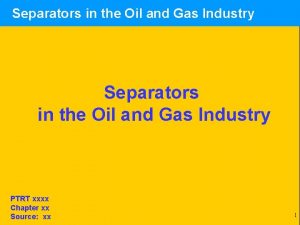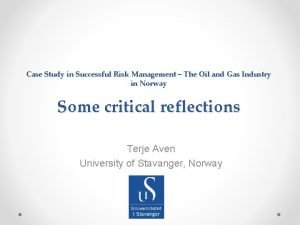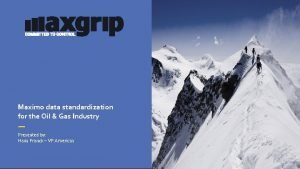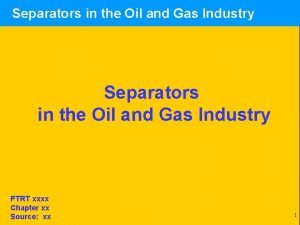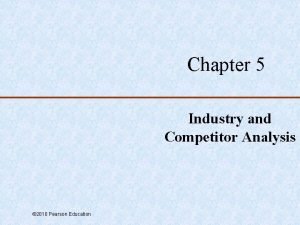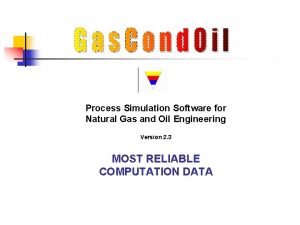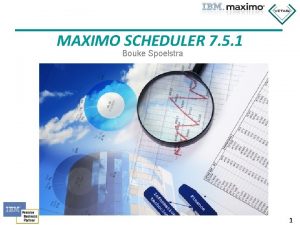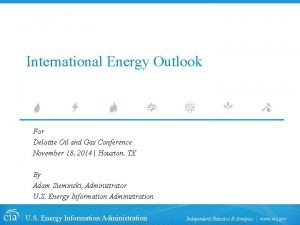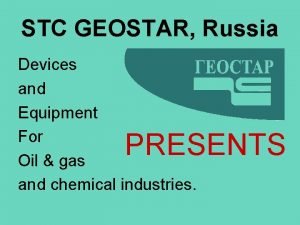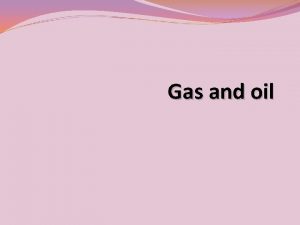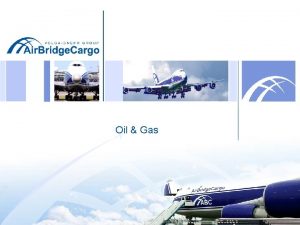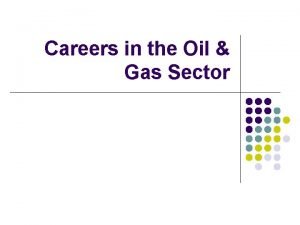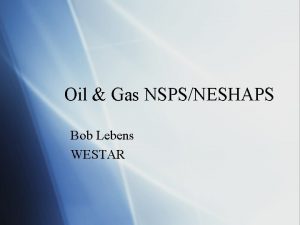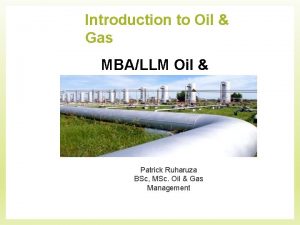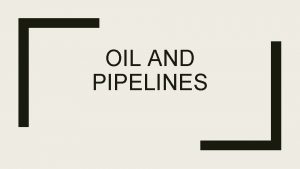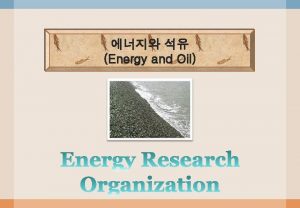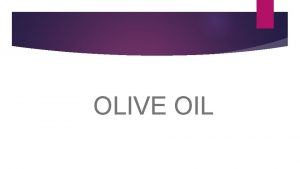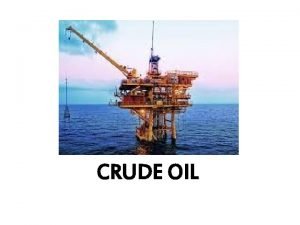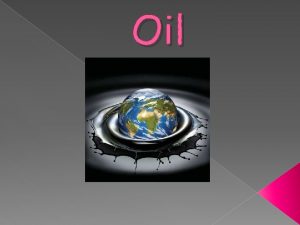Exploring Opportunities in the Oil and Gas Industry

















- Slides: 17

Exploring Opportunities in the Oil and Gas Industry Chad Ferguson – Exploration Geologist @ BHP Billiton Petroleum UC Geology Career Days - 2014

What does an O&G Career Look Like for a Geoscientist? • Make a good living working in the ‘subsurface’ (i. e. , doing geology!) • Lots of opportunity once you get your foot in the door, but can be difficult to access • Professional, high-tech work environment with lots of perks • Types of roles/opportunities depend on your skill set, level of education, and the type of company/organization

Types of Companies/Organizations • The ‘Majors’ – Exxon, Shell, BP, Chevron, Total (and a few almost majors); aka, IOC’s • Independents – Conoco. Phillips, Marathon, BHPBilliton, Oxy, Chesapeake, etc. • Small-Shops • NOC’s – Petrobras, Pemex, Saudi Aramco, etc. • Regulatory – BOEM/BSEE • Service Industry – Schlumberger, Haliburton, Baker. Hughes, Weatherford, PGS, TGS, CGGV, Western. Geco, Ion. GXT, PSI, Core. Lab, etc. • Finance – Investment Banks, M&A

Role Examples for Geoscientists • • • • Geologist Geophysicist Petroleum Systems Analyst/Basin Modelers Structural Geology Specialist Biostratigrapher Sedimentologist/Stratigrapher/Rock Quality Specialist Petrophysicist Pore-Pressure Specialist Shallow Hazards Specialist Processing/Imaging/Acquisition Geophysicist Geomechanicist Geo-Technical Wellsite Geologist/Mudlogger/Sample Catcher Logging Engineer/Log Analyst

Industry Phases – Exploration – looking for oil, predrill through discovery – Appraisal – Appraising Discoveries for Commerciality/Reducing Uncertainty/’Right-sizing’ – Development – Building Facilities, Drilling Wells – Production – Optimizing depletion of Hydrocarbons from reservoirs – Abandonment – Safely decommissioning facilities and wells deemed no longer economically viable. • Support – R&D/Technology – In-House Specialist Services – Contractors

“What would ya say you do here? ” Borrowed from You. Tube

Well, Bob’s… • We – – Assess and interpret subsurface data – Develop geologic models – Communicate Uncertainty - (? ? ? ) – Characterize Risk - (!!!) – Prognose resource potential and targets – Plan wells – Support Engineering and Commercial Disciplines – Inform Management

Who gets hired into Industry? • Entry-level Degrees – Major/Independent • Graduate Degree (MS/Ph. D), usually a MS in Geology or Geophysics – Service • BS/MS/Ph. D in Geology or Geophysics, depending on the role. • Recruiting Heavily Tilted Towards Oil Patch Schools • The Majors and Service sector hire the largest volume and many independents build out staff through head-hunting from these talent pools • For example – – a Major may bring in 50 -100 Geo’s in a recruiting cycle – An Independent might bring in 10 or less – Service Sector companies might bring in 100’s, but the jobs can be less desirable

Industry Pro’s/Con’s • Pro’s – – – People Technology Compensation Lifestyle They actually pay you to be a geologist (how absurd!) • Con’s – Commodity Industries are Cyclical • Only the most skilled, motivated, or adaptable people end up with a 30+ yr career – Geographically Concentrated – Corporate Cultures… and sometimes cube farms – It is a business, after all… working towards goals set ‘up dip’

Is it worth the effort? • Salary – MS in Geoscience > $100, 000 to start with Majors (more with Indies, less with Service) – ~10+% annual performance bonus (same as above) – Interns generally earn the same as a new-hire on their three month contract, with benefits… even if you choose not to enter industry in long run, you could make two years of stipend earnings over a summer. • Benefits/Perks – Good Medical, Retirement benefits – 9/80 Fridays; gym, cafeteria, childcare, medical on site; commuting support • Hours • Training – Among ‘Operators’, flexible workplaces are common, most roles don’t work more than weekly hours – 2 or 3 week rotational shift work is common in service/operational sphere – The bigger the company the better the training tends to be… – Operators are better at providing training than the service sector – Training is highly valuable in today’s job market because it accelerates capability development http: //www. geoexpro. com/articles/2009/02/the-great-crew-change

Is it worth the effort? • Locale (? ) – Houston is the center of the O&G universe, but opportunities for expat postings overseas or in places like Denver, Alaska, OKC, NOLA, Bakersfield, Pittsburgh can be had. • Demographics/Opportunity – The ‘Great Crew Change’ is happening… opportunities are plentiful for those prepared to take advantage of them • The Future http: //www. geoexpro. com/articles/2009/02/the-great-crew-change

Graduate or Undergraduate Path? How you might start your career Grad Exploration/Appraisal Generalist MS/Ph. D Production/Development These are the most desirable technical positions in Industry and are usually with ‘operators’ or the largest service companies Specialist Technology/In-House Services/Higher-End Service Sector Operations Ops Geo, Wellsite, Geosteering, Shallow Haz Undergrad (or under recruited grads…) With a few years experience, can become: BS Mud-Logging -service companies, onshore Wellsite Geo Mud Engineer Directional Driller Mud-logger (offshore) Salt-Picking -seismic processor Processing Project Lead Seismic Interpreter Always Opportunities at this entry point because of turnover due to head-hunting or burnout People are in great demand… those with potential get trained to do something more vital With 5 -10 years experience, can become: Development Geologist Ops Geologist PPFG Specialist Sales/Account Rep Geophysicist Sales/Account Rep Operators head-hunt from Service Sector… You could jump into the bracket above or stay on and climb the mgmt track

How to find an opportunity and get noticed… • Students at UC are presently at a disadvantage… • But, here are some things to think about – – Your work speaks for you… do something with cross-over appeal, and be able to communicate that appeal – Join, participate in, and present at AAPG/SEG – Understand Recruiting Cycles and attend industry Student Expo’s (see Resources slide for link) – Apply online for internships, every year, with as much effort as you put into your last GSA grant proposal!!! – Have Dept. help you reach out to neighboring schools (IU, OSU, UK, Purdue, etc. ) for interview opportunities before recruiting season begins – Reach Out to Alumni in Industry • Find out if you might fit or if the work might interest you • Opportunity to name drop! • Learn to speak the language of ‘the industry’ – Encourage the Department to engage Industries where you might want to work • Some things the Dept. might consider doing now – – Start an AAPG student chapter Acquire workstation seismic/log interpretation software (there are some good open-source options) Find a corporate sponsor/state survey to donate subsurface data Begin preparations to field an Imperial Barrel Team

What else can you do to prepare? • Industry training opportunities • Sponsored Short Courses/Field Trips • Familiarize yourself with seismic and well-log data • Network • The ‘elevator speech’ • What you’re about, what you’ve done, and what you want to do in <60 seconds

O&G Recruiting Cycle – Key Challenges • Graduate recruiting cycles operate a year in advance of a candidate potentially starting an internship or full-time position… last minute or half-hearted attempts will get you shut of the best opportunities • Recruiting is almost rigged towards oil-patch schools; UC students don’t have the luxury of the job market coming to them… – You have to spread a wide net and work things from unconventional angles (alumni, professional meetings, online app’s, etc. ) – Attracting recruiters should be a long-term goal and will require a proactive approach from Dept. and University

O&G Recruiting Cycle – 2015 Example • 2015 Summer Internship Cycle (same for every year, so use this as an example) • Spring-Summer 2014 – Present at meetings and network – Build industry formatted resume – Start submitting online applications • September 2014 – Interview at Student Expos, nearby Universities, or on-site with a company if selected • October/November 2014 – Offers made for internships to start June 2015 • June 2015 – Start 3 Month (well-paid) Internship – a 90 day onsite job interview! • September 2015 – Fulltime offers made to best interns in class for 2016 (Ph. D’s are a bit different as they may do 4+ internships over length of study and have no defined end-date) • November 2015 – Fulltime offers made to 2015 interviewee’s to fill out any remaining openings in 2016

Resources • Professional Societies/Meetings • AAPG, SEPM, SEG, AGU, EAG, GCSSEPM, GCAGS (but, sadly, not GSA) • AAPG Student Expo’s – http: //www. seg. org/web/aapg-seg-student-expo/other-expos • Linked. In (networking, jobs, headhunting) – https: //www. linkedin. com/ • Rigzone (jobs, news) – http: //www. rigzone. com/ • Glass. Door (job/internship postings/salary/reviews) – http: //www. glassdoor. com/index. htm • Virtual Seismic Atlas (data) – http: //www. seismicatlas. org/ • Alumni • Company Websites!
 Types of separators in oil and gas industry
Types of separators in oil and gas industry [email protected]
[email protected] Risk management case study oil and gas industry
Risk management case study oil and gas industry Standardization in oil and gas industry
Standardization in oil and gas industry Types of separators in oil and gas industry
Types of separators in oil and gas industry Identification test for emulsion
Identification test for emulsion Industry types and the opportunities they offer
Industry types and the opportunities they offer Catalytic heater oil and gas
Catalytic heater oil and gas Process simulation software in oil gas market
Process simulation software in oil gas market Ibm maximo scheduler
Ibm maximo scheduler Maximo oil and gas scheduler tutorial
Maximo oil and gas scheduler tutorial Madagascar oil and gas
Madagascar oil and gas Deloitte webmail outlook
Deloitte webmail outlook Hitachi vantara oil and gas
Hitachi vantara oil and gas Drops oil and gas
Drops oil and gas Uses of oil and gas
Uses of oil and gas Atb oil and gas
Atb oil and gas Echometer oil and gas
Echometer oil and gas
